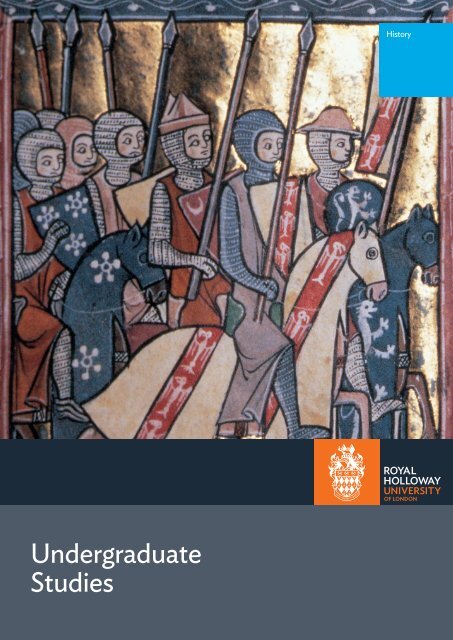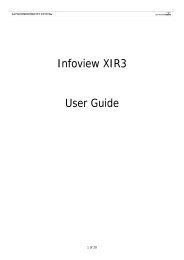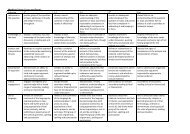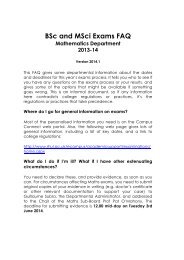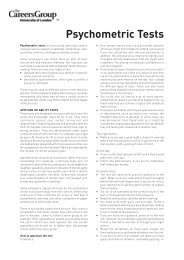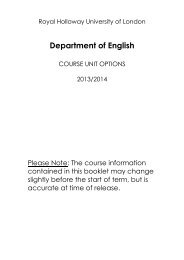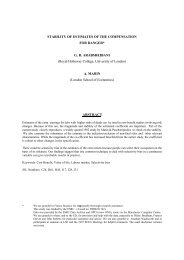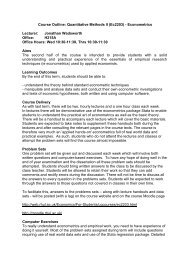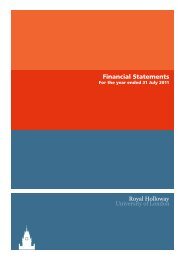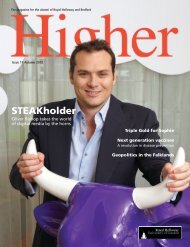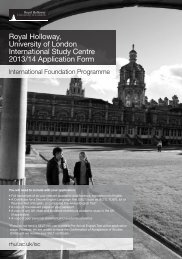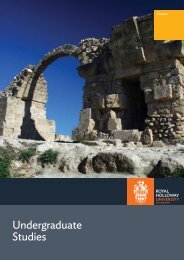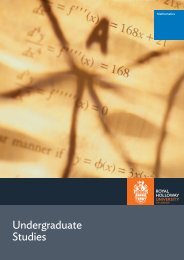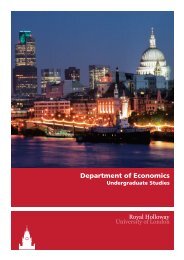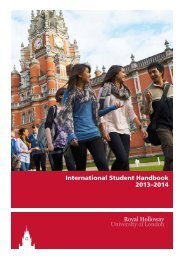Department of History - Royal Holloway, University of London
Department of History - Royal Holloway, University of London
Department of History - Royal Holloway, University of London
Create successful ePaper yourself
Turn your PDF publications into a flip-book with our unique Google optimized e-Paper software.
Undergraduate<br />
Studies<br />
<strong>History</strong>
<strong>Royal</strong> <strong>Holloway</strong> is widely recognised on the world<br />
stage as one <strong>of</strong> the UK’s leading teaching and<br />
research universities. One <strong>of</strong> the larger colleges<br />
<strong>of</strong> the <strong>University</strong> <strong>of</strong> <strong>London</strong>, we are strong across<br />
the sciences, social sciences, arts and humanities.<br />
Our 8,500 students work with internationally<br />
renowned scholars in 20 academic departments.<br />
The <strong>University</strong> <strong>of</strong> <strong>London</strong> degree gained by our<br />
talented, high-achieving graduates is valued the<br />
world over.<br />
As a cosmopolitan community, with students<br />
from 130 countries, we focus on the support<br />
and development <strong>of</strong> the individual. Our friendly<br />
campus, just 19 miles west <strong>of</strong> central <strong>London</strong>,<br />
provides a unique environment for university<br />
study. Campus life revolves around the Students’<br />
Union, which runs over 100 societies and sports<br />
clubs, and we are recognised as <strong>London</strong>’s best<br />
sporting college.<br />
2 <strong>Department</strong> <strong>of</strong> <strong>History</strong>
<strong>History</strong><br />
Contents<br />
The <strong>History</strong> <strong>Department</strong> at <strong>Royal</strong><br />
<strong>Holloway</strong> is a vibrant and friendly place<br />
with a global reputation for the quality<br />
<strong>of</strong> its teaching and research.<br />
You will work with internationally<br />
renowned specialists who are<br />
developing the very latest thinking on<br />
historical problems. This cutting edge<br />
knowledge informs the curriculum and<br />
enhances your learning experience.<br />
As a member <strong>of</strong> one <strong>of</strong> the largest and<br />
most influential <strong>History</strong> departments<br />
in the country, you can choose from<br />
an exceptional range <strong>of</strong> historical<br />
subjects.<br />
We are committed to providing<br />
individual attention to each student<br />
and <strong>of</strong>fer a supportive intellectual<br />
environment conducive to study.<br />
By studying <strong>History</strong> at <strong>Royal</strong> <strong>Holloway</strong><br />
you will gain a strong basis for a variety<br />
<strong>of</strong> rewarding careers or further study.<br />
Why study <strong>History</strong> at <strong>Royal</strong> <strong>Holloway</strong>? 4<br />
Admissions and entry requirements 6<br />
Degree options 7<br />
Degree structure 8<br />
Teaching and assessment 11<br />
Your future career 12<br />
Resources 13<br />
Other information 14<br />
Academic staff and their research interests 15<br />
This brochure is designed to complement <strong>Royal</strong> <strong>Holloway</strong>’s Undergraduate<br />
Prospectus and information on the department’s website at:<br />
royalholloway.ac.uk/history<br />
It is also available as a PDF at:<br />
royalholloway.ac.uk/studyhere<br />
Front: Image courtesy <strong>of</strong> Bibliothèque Municipale de Boulogne s/Mer<br />
Contact details<br />
Head <strong>of</strong> <strong>Department</strong><br />
Pr<strong>of</strong>essor Jonathan Phillips<br />
j.p.phillips@rhul.ac.uk<br />
Admissions Team<br />
Dr Daniel Beer, Dr Clive Burgess<br />
historyadmissions@rhul.ac.uk<br />
School Liaison<br />
Dr Stella Moss<br />
stella.moss@rhul.ac.uk<br />
<strong>Department</strong> <strong>of</strong> <strong>History</strong><br />
T: +44 (0)1784 443314<br />
F: +44 (0)1784 433032<br />
<strong>Department</strong> <strong>of</strong> <strong>History</strong><br />
3
Why study <strong>History</strong> at <strong>Royal</strong> <strong>Holloway</strong>?<br />
Welcome<br />
I am delighted that you are considering coming<br />
to study <strong>History</strong> at <strong>Royal</strong> <strong>Holloway</strong>, one <strong>of</strong> the<br />
most dynamic and innovative departments in the<br />
country. Whether <strong>of</strong>fering a range <strong>of</strong> courses from<br />
Antiquity to contemporary Islam, investing in new<br />
eLearning technology, or exploring the impact <strong>of</strong><br />
Public <strong>History</strong>, our department is a world leader in<br />
providing a <strong>History</strong> degree that relates the past to<br />
the present.<br />
Studying <strong>History</strong> is exciting! We derive pleasure<br />
from satisfying our curiosity about the past,<br />
acquiring understanding <strong>of</strong> specific periods and<br />
problems, and making discoveries. The study <strong>of</strong><br />
the past also gives us the opportunity to investigate<br />
how we have arrived at our present-day world.<br />
Historical enquiry allows us to see how large-scale<br />
processes <strong>of</strong> social, economic and political change<br />
have interacted with individual passion, ambition,<br />
and foolishness. A <strong>History</strong> degree means that you<br />
will develop a range <strong>of</strong> personal qualities, skills and<br />
– importantly – pleasures that will stay with you<br />
for the rest <strong>of</strong> your life and can be transferred to<br />
many different careers. Your degree will make you<br />
extremely employable. Emerging from your degree<br />
informed, engaged and independent – armed with<br />
skills <strong>of</strong> analysis and moderate scepticism – you<br />
will be an asset to an employer in virtually any field,<br />
whether industry, commerce, the Arts or the public<br />
sector. We <strong>of</strong>fer an innovative range <strong>of</strong> careers<br />
advice, opportunities and workshops, carefully<br />
tailored to enhance your employability.<br />
Being trained as a historian means that you will<br />
think clearly and boldly – and perhaps more<br />
importantly you will feel capable <strong>of</strong> passing careful<br />
judgement on the societies in which we live.<br />
I hope very much that you come and study with us.<br />
To find out more about our courses, do visit us on<br />
an Open Day, or contact our Admissions Tutors.<br />
Jonathan Phillips<br />
Head <strong>of</strong> <strong>Department</strong><br />
• You’ll be taught by leading academics with international<br />
research reputations and high media pr<strong>of</strong>ile<br />
• Compelling and flexible degree programmes covering<br />
remarkable depth and allowing you to explore broader<br />
interests by combining <strong>History</strong> with other subjects<br />
• Our <strong>History</strong> students have given us a satisfaction score <strong>of</strong> 96%<br />
for our teaching on their courses<br />
• <strong>University</strong> <strong>of</strong> <strong>London</strong> degree that is valued worldwide<br />
• We are in the top ten for career prospects, with our graduates<br />
going on to success in a variety <strong>of</strong> fields including media,<br />
law, finance, industry, teaching, heritage and the civil service<br />
(Times Good <strong>University</strong> Guide, 2013)<br />
• Dedicated support network, including a personal Academic<br />
Advisor to guide you in your studies<br />
• Access to some <strong>of</strong> the richest facilities for historical research<br />
anywhere in the world, including the National Archives at<br />
nearby Kew, the British Library and other libraries <strong>of</strong> the<br />
<strong>University</strong> <strong>of</strong> <strong>London</strong><br />
• Spirited sense <strong>of</strong> community and programme <strong>of</strong> events<br />
• Extensive postgraduate opportunities with a commitment to<br />
pioneering research and to <strong>History</strong> as a public forum<br />
• Excellent communication links – central <strong>London</strong> is only a<br />
40-minute train ride away, and some <strong>of</strong> the most important<br />
landmarks in British history, including Runnymede where the<br />
Magna Carta was signed in 1215, are on our doorstep<br />
• A wide range <strong>of</strong> Study Abroad opportunities in Europe and<br />
around the world<br />
• A culturally diverse staff and student body.<br />
Our public pr<strong>of</strong>ile<br />
We are a dynamic and outward-looking department.<br />
Many <strong>of</strong> the people who will teach you have a strong<br />
pr<strong>of</strong>ile in the public communication <strong>of</strong> history on<br />
television and radio, and in newspapers, magazines and<br />
online media, as well as working in an advisory capacity<br />
to the government on topical issues.<br />
4 <strong>Department</strong> <strong>of</strong> <strong>History</strong>
Our research-led teaching<br />
We see a close relationship<br />
between top-quality research<br />
and excellent teaching.<br />
Many courses incorporate<br />
aspects <strong>of</strong> our research and<br />
we continue to introduce<br />
new ideas as we teach,<br />
bringing cutting-edge <strong>History</strong><br />
into the classroom and<br />
sharing in the excitement<br />
<strong>of</strong> original discoveries and<br />
interpretations.<br />
The range <strong>of</strong> research – also<br />
reflected in the breadth <strong>of</strong><br />
courses we <strong>of</strong>fer – is shown<br />
in this selection <strong>of</strong> books<br />
published by our staff.<br />
Photos: Pr<strong>of</strong>essor Justin<br />
Champion, an expert in the<br />
<strong>History</strong> <strong>of</strong> Early Modern<br />
Ideas; Pr<strong>of</strong>essor Jonathan<br />
Phillips (with Channel 4’s<br />
Rageh Omar); Pr<strong>of</strong>essor<br />
David Cesarani, an expert on<br />
modern Jewish history and<br />
culture and the Holocaust;<br />
Dr Anna Whitelock, a<br />
regular commentator on<br />
Public <strong>History</strong>; Writer and<br />
broadcaster Lord Melvyn<br />
Bragg, who received an<br />
honorary degree from<br />
<strong>Royal</strong> <strong>Holloway</strong> in 2013.<br />
<strong>Department</strong> <strong>of</strong> <strong>History</strong><br />
5
Admissions and entry requirements<br />
We welcome candidates from all backgrounds and recognise a<br />
variety <strong>of</strong> UK and international qualifications for entry purposes.<br />
Most sixth form applicants take <strong>History</strong> A-level but it is possible<br />
to enter the <strong>Department</strong> with a combination <strong>of</strong> other subjects<br />
as long as you are able to demonstrate your commitment to<br />
studying <strong>History</strong> in your personal statement.<br />
We look for applicants <strong>of</strong> AAB-ABB standard at A-level or 35-34<br />
in the IB. <strong>Royal</strong> <strong>Holloway</strong> also accepts a number <strong>of</strong> overseas<br />
qualifications including USA Advanced Placements, the<br />
Canadian High School Diploma, and many more. Further details<br />
<strong>of</strong> all acceptable qualifications can be found at<br />
royalholloway.ac.uk/international/yourcountry<br />
As part <strong>of</strong> our commitment to widening participation, we<br />
encourage mature students with different forms <strong>of</strong> qualification,<br />
including Access courses, and we treat each application<br />
individually. If you feel that AAB-ABB is beyond your reach,<br />
not because <strong>of</strong> your ability but because <strong>of</strong> your particular<br />
educational background, please do not feel that there is no point<br />
in applying. We are ready to recognise academic potential as<br />
well as achievement, and our aim is to achieve a diverse student<br />
group.<br />
The step between school or college and university is a big one,<br />
and so if you are tempted to take a gap year you have our full<br />
support.<br />
Applications for entry to all our full-time undergraduate degrees<br />
must be made through the Universities and Colleges Admissions<br />
Service (UCAS). To make an application, you will need to apply<br />
online. Before you apply, please do visit on one <strong>of</strong> the College<br />
Open Days if you can. If we make you an <strong>of</strong>fer, we will invite you<br />
to attend a <strong>Department</strong>al Open Day for candidates so that you<br />
can talk to lecturers and students and make sure that this is the<br />
right course for you. Under exceptional circumstances, we may<br />
want to interview before making an <strong>of</strong>fer.<br />
If your first language is not English, you should be able to provide<br />
recent evidence that your spoken and written command <strong>of</strong> the<br />
English language is adequate – this will ensure you benefit fully<br />
from your course. More information can be found at<br />
royalholloway.ac.uk/international - select Applying<br />
6 <strong>Department</strong> <strong>of</strong> <strong>History</strong>
Degree options<br />
There are over 550 undergraduates in the <strong>Department</strong>,<br />
approximately two-thirds reading for the BA in <strong>History</strong> (V100)<br />
and the remainder in Modern <strong>History</strong> and Politics (V136) and our<br />
various joint degrees, such as <strong>History</strong> and International Relations<br />
(VL12). [*four year degree]<br />
V100<br />
V136<br />
<strong>History</strong><br />
Modern <strong>History</strong> and Politics<br />
<strong>History</strong> as a Major subject<br />
V1R4<br />
<strong>History</strong> with Spanish<br />
<strong>History</strong> as a Minor subject<br />
R2V1<br />
Joint degrees<br />
VV19<br />
QV31<br />
RV11<br />
RV21<br />
VL12<br />
VW13<br />
VV51<br />
VR14<br />
German with <strong>History</strong>*<br />
Ancient & Medieval <strong>History</strong><br />
English & <strong>History</strong><br />
French & <strong>History</strong><br />
German & <strong>History</strong><br />
<strong>History</strong> & International Relations<br />
<strong>History</strong> & Music<br />
<strong>History</strong> & Philosophy<br />
<strong>History</strong> & Spanish<br />
Most <strong>of</strong> our <strong>History</strong> degrees are also available as ‘with an<br />
International Year’ programmes, with a year spent studying at<br />
another top university abroad. Our undergraduates can spend an<br />
International Year at one <strong>of</strong> the excellent universities in Australia,<br />
New Zealand, Canada, Hong Kong, Singapore, Japan and the<br />
USA with which we have exchange agreements. Students apply<br />
during their second year, and, if successful, will study abroad<br />
during their third year, before returning to <strong>Royal</strong> <strong>Holloway</strong> for a<br />
fourth and final year <strong>of</strong> study. Fees for the International Year are<br />
heavily subsidised, and scholarships are also available. A full list<br />
<strong>of</strong> our partner universities can be found at royalholloway.ac.uk/<br />
international.<br />
<strong>Royal</strong> <strong>Holloway</strong> is also an active participant in the Erasmus<br />
programme, and the <strong>History</strong> <strong>Department</strong> has links with<br />
prestigious universities across Europe. Students wishing to attend<br />
a European university during their International Year will need<br />
to meet the relevant language requirements at either A-level or<br />
GCSE. For more details <strong>of</strong> the opportunities to study abroad, see<br />
our website, or contact one <strong>of</strong> the Admissions Tutors.<br />
“I leapt at the opportunity to study at <strong>Royal</strong> <strong>Holloway</strong>,<br />
a university with an international reputation and one<br />
<strong>of</strong> the best history departments in the UK. The huge<br />
range and breadth <strong>of</strong> courses available to me, combined<br />
with the university’s advanced facilities and dedicated,<br />
friendly members <strong>of</strong> staff, never ceased to stimulate and<br />
broaden my knowledge.<br />
The innovative teaching methods and skills courses<br />
helped me develop as an historian and endowed me<br />
with skills that I can use for the rest <strong>of</strong> my life. <strong>Royal</strong><br />
<strong>Holloway</strong>’s active Student Union and position as the<br />
largest sporting college in the <strong>University</strong> <strong>of</strong> <strong>London</strong> also<br />
ensures that there is always plenty to do, whatever your<br />
interest.”<br />
Mark Whelan<br />
<strong>Department</strong> <strong>of</strong> <strong>History</strong><br />
7
Degree structure<br />
Degrees at <strong>Royal</strong> <strong>Holloway</strong> are based on the course unit system,<br />
allowing an effective approach to study within a developmental<br />
structure. We aim to give you maximum flexibility to pursue your<br />
own historical interests while helping you to construct a coherent<br />
degree programme which provides a sense <strong>of</strong> the development <strong>of</strong><br />
societies and institutions over time.<br />
BA Honours<br />
Group 3<br />
Level 3<br />
Group 2<br />
Level 3<br />
Dissertation<br />
Level 2<br />
Group 1<br />
Group 2<br />
Independent<br />
Research Essay<br />
Level 2<br />
Level 1<br />
Foundation Courses<br />
Gateways<br />
Level 1<br />
8 <strong>Department</strong> <strong>of</strong> <strong>History</strong>
First year courses are designed to introduce you to degree level<br />
study. They also <strong>of</strong>fer you the opportunity to experiment with<br />
new periods or topics that you may not have explored before.<br />
Foundation courses are designed to initiate you into unfamiliar<br />
but all-important skills and methods; and Gateways introduce<br />
broad historical themes and new periods and cultures.<br />
Year 1 courses include:<br />
Foundation units<br />
• <strong>History</strong> and Meanings I and II<br />
Gateway units<br />
• Gods, Men and Power: The Ancient World from Homer to<br />
Mohammed<br />
• Rome to Renaissance: An Introduction to the Middle Ages<br />
• Republics, Kings and People: The Foundations <strong>of</strong> European<br />
Political Thought from Plato to Rousseau<br />
• The Rich Tapestry <strong>of</strong> Life: Early Modern England, Europe and<br />
the Wider World, 1453-1789<br />
• Conflict and Identity in the Modern World from 1789 to the<br />
Present<br />
• From Mao to Mandela: 20th Century Political Leaders in the<br />
non-Western World<br />
• Greater Britain? Domestic and Imperial Life in 20th Century<br />
Britain<br />
In your second year, you will study a mixture <strong>of</strong> Group 1 outline<br />
courses, which survey a wide chronological span, perhaps for a<br />
country or region, and Group 2 courses, where the emphasis is<br />
on tracing a more discrete theme or idea, <strong>of</strong>ten across a narrower<br />
period <strong>of</strong> time. You will also independently research a topic <strong>of</strong><br />
your own choice for a 5,000-word research essay.<br />
Group 1 courses (Year 2) include:<br />
• The Rise and Fall <strong>of</strong> the Roman Republic<br />
• The Roman Empire from Augustus to Commodus<br />
• The Flowering <strong>of</strong> the Middle Ages<br />
• The Silk Road: Genghis Khan and the Mongol Legacy, 1200–<br />
1500<br />
• Medicine from Antiquity to the Medieval Near East<br />
• Daily Life in Renaissance and Baroque Italian cities<br />
• New Worlds, Lost Worlds: The Tudor Monarchy, 1485–1605<br />
• Killing the King: England in an Age <strong>of</strong> Revolutions, 1603-1714<br />
• <strong>History</strong> <strong>of</strong> the British Empire, 1763–1900<br />
• The Victorians: British <strong>History</strong>, 1837–1901<br />
• <strong>History</strong> <strong>of</strong> the USA since 1787<br />
• Spain, 1898–1989<br />
• The European Crucible, 1914–1945<br />
• 20th Century World <strong>History</strong>: The Asian Resurgence<br />
• Modern British <strong>History</strong>, 1914–1973<br />
• The Politics <strong>of</strong> Post-War Europe, 1945–2000<br />
• Awakening China: From the Opium Wars to the Present Day<br />
Group 2 courses (Years 2 & 3) include:<br />
• The Later Roman Empire<br />
• Byzantium and its Neighbours, 641–1081<br />
• The Crusades and the Eastern Mediterranean, 1095–1291<br />
• <strong>London</strong> Urban Society, 1400–1600<br />
• Medicine and Society in Medieval Europe<br />
• Tudor Queenship: Mary I and Elizabeth I, 1553–1603<br />
• The Lever <strong>of</strong> Riches: Perspectives on the Making <strong>of</strong> Capitalism<br />
• From Blood and Guts to the Worried Well: Medicine in Britain,<br />
c.1750–1990<br />
• From Rakes to Respectability: Society and Culture in Britain,<br />
1815–1851<br />
• The Islamic Revival: From 18th Century Reform to 20th<br />
Century Political Action<br />
• The Western Powers and East Asia, 1839–1945<br />
• The Russian Empire in the Age <strong>of</strong> Reform and Revolution,<br />
1856–1917<br />
• The Edwardians and their Legacy: Culture and Identity in<br />
Britain, 1901–1939<br />
• Modern Girls: Women in Britain, c.1914–1984<br />
• Nationalism, Democracy and Minorities in central Europe,<br />
1918–1939<br />
• Spain in Conflict, 1930–1953<br />
• Modern and Contemporary Italy<br />
• Modernizing Despots and Angry Mullahs: Development and<br />
Popular Resistance in the Muslim World, 1930–1980<br />
• Martin Luther King and the Civil Rights Movement, 1955–1968<br />
• Modern Political Ideas<br />
• ‘The Devil’s Decade’: Britain, America and the Great Slump,<br />
1929–1941<br />
• Genocide<br />
• ‘Dragon Ladies?’ Society, Politics and Gender in Modern<br />
China<br />
• A <strong>History</strong> <strong>of</strong> Terrorism<br />
<strong>Department</strong> <strong>of</strong> <strong>History</strong><br />
9
Degree structure continued<br />
In the third year you will study a further Group 2 paper (see<br />
above) alongside your final year Group 3 Special Subject, the high<br />
point <strong>of</strong> your degree course. Here the focus is further tightened<br />
to allow you to explore in depth a particular historical period,<br />
issue or theme through the use <strong>of</strong> selected primary sources.<br />
Connected with this you will write a 10,000-word dissertation<br />
based on original research. Special subjects are convened<br />
by expert tutors who are likely to have undertaken their own<br />
research and historical writing in the chosen field. Throughout<br />
your third year you will be encouraged to reflect on the broad<br />
historical themes and debates encountered during your whole<br />
degree course.<br />
Group 3 courses (Year 3) include:<br />
• Christians and Pagans from Constantine to Augustine,<br />
AD 306–430<br />
• Heresy, Crusade and Inquisition in Southern France,<br />
c.1140–c.1300<br />
• England in the Reign <strong>of</strong> Richard II<br />
• The Causes and Consequences <strong>of</strong> the Fall <strong>of</strong> Constantinople,<br />
1453<br />
• Blasphemy, Irreligion and the English Enlightenment, 1620–<br />
1720<br />
• Genghis Khan and His Empire, 1150-1300<br />
• Representing Authority from Henry VII to Charles II<br />
• Enlightenment Paris, c.1721–1789<br />
• The Empire in Victorian Britain, c.1830–1870<br />
• Victorian Social and Political Thought<br />
• Victorian Babylon: Life, Work and People in <strong>London</strong>, c.1840–<br />
1890<br />
• Photography, Film and British Society, 1850–1965<br />
• Berlin: A European Metropolis in the 20th Century<br />
• Stalinism, 1917–1941<br />
• The <strong>History</strong> and Historiography <strong>of</strong> the Holocaust<br />
• The Clash <strong>of</strong> Cultures: Sino-American Relations during the<br />
Cold War; Politics and Society in Palestine c.1900–1948<br />
• The Bomb – A <strong>History</strong>: Atomic Weaponry and Society in the<br />
20th Century<br />
• Malcolm X and African American Islam<br />
• China and the World: Migration and Diaspora 1800-1945<br />
• Migration, Identity and Citizenship in Modern Britain<br />
• The Age <strong>of</strong> Terror: Terrorism from 1945-present<br />
Part-time degrees<br />
If you have a full-time job, or other substantial external<br />
commitments, it is possible to study part-time, taking two units a<br />
year over six years.<br />
It is also possible to transfer between the part-time and full-time<br />
degree in the course <strong>of</strong> your study, subject to the <strong>Department</strong>’s<br />
agreement.<br />
“My studies really fostered my love <strong>of</strong> history so much<br />
so that I decided to peruse a career within the museum<br />
and heritage sector. By studying a broad range <strong>of</strong> time<br />
periods within my course I have been able to work<br />
in a variety <strong>of</strong> different museum and heritage sites<br />
ranging from my local history museum to the Houses <strong>of</strong><br />
Parliament.”<br />
Corinne Galloway, Learning Projects Officer<br />
10 <strong>Department</strong> <strong>of</strong> <strong>History</strong>
Teaching and assessment<br />
Most courses are taught through a combination <strong>of</strong> lectures,<br />
<strong>of</strong>fering an overview <strong>of</strong> important themes, and weekly discussion<br />
groups, for which you will need to prepare in advance and where<br />
you will be encouraged to present and debate your ideas. Your<br />
writing skills will be developed through coursework essays, on<br />
which your tutor will comment and provide feedback, and which<br />
represent an important chance to develop your powers <strong>of</strong> written<br />
argument. The regular submission <strong>of</strong> written work is required<br />
throughout all our courses, reflecting the important place that<br />
writing and presentation skills hold in the discipline <strong>of</strong> <strong>History</strong>.<br />
In the first year, Foundation courses are assessed solely by<br />
coursework; Gateway courses by examination and coursework.<br />
In the second year, Group 1 and Group 2 courses are assessed by<br />
various combinations <strong>of</strong> examination and coursework. You are<br />
also assessed on your 5,000-word independent research essay.<br />
In the third year, Group 3 courses are assessed by an examination<br />
(including essays and commentaries on your source texts), oral<br />
assessment, and a 10,000-word dissertation that uses primary<br />
sources.<br />
“From the moment I drove through the gates at <strong>Royal</strong><br />
<strong>Holloway</strong> and saw the amazing Founder’s Building, I<br />
knew that it was the place I wanted to study <strong>History</strong>.<br />
The <strong>History</strong> degree gave me the chance to experience<br />
areas <strong>of</strong> <strong>History</strong> I had not studied before as well as<br />
more familiar topics. The degree structure allowed me<br />
to construct my own individual pr<strong>of</strong>ile <strong>of</strong> courses with<br />
helpful advice always on hand from course tutors and my<br />
own personal tutor. The various amenities available, and<br />
the tremendous diversity <strong>of</strong> the student body, have meant<br />
that I have gained not only a strong academic grounding<br />
but I’m well prepared for life after my degree too.”<br />
Alliccia Hernandez<br />
<strong>Department</strong> <strong>of</strong> <strong>History</strong><br />
11
Your future career<br />
What can I do with a <strong>History</strong> degree?<br />
There is substantial demand for <strong>History</strong> graduates precisely<br />
because a <strong>History</strong> degree develops exactly the skills and qualities<br />
for which employers are looking. Career patterns too are<br />
becoming ever more flexible. So by training you to understand<br />
and respect other values and cultures, a <strong>History</strong> degree equips<br />
you to operate successfully in a fast-changing and increasingly<br />
globalised and multi-cultural environment. As a historian, you<br />
will be a well-informed and alert individual, ideally placed to<br />
develop insights and make decisions based on multi-layered<br />
understandings <strong>of</strong> how international systems and domestic<br />
social, economic and cultural factors operate and interconnect.<br />
88% <strong>of</strong> our most recent graduates were in employment or<br />
enhancing their skills with further study six months after<br />
graduation*. Examples <strong>of</strong> the jobs they have gone into are<br />
listed on the right. Recent employers include the <strong>Department</strong><br />
<strong>of</strong> Education, BNP Paribas, Accenture, Explore Learning,<br />
Birmingham Museum and Art Gallery, Channel 4 and Classic FM.<br />
A <strong>History</strong> degree provides a valuable training for many<br />
pr<strong>of</strong>essions. It is highly regarded by employers because it<br />
develops skills that they value. Students learn critical evaluation,<br />
information analysis and prioritisation in their independent<br />
study. The directed group work that forms an element within the<br />
curriculum directly fosters teamwork. Likewise, opportunities to<br />
debate and deliver seminar presentations build confidence and<br />
communication skills.<br />
Tailor-made careers advice for historians<br />
From 2013/14 we are holding an annual careers day <strong>of</strong>fering our<br />
students an insight into the range <strong>of</strong> jobs that graduates <strong>of</strong> the<br />
<strong>History</strong> department have chosen to pursue. Our aim is to give<br />
you a particular insight into many <strong>of</strong> the careers listed above (and<br />
more!), clearly show you how the skills you’ll acquire during your<br />
degree can be applied, and <strong>of</strong>fer advice on how to embark on<br />
your chosen career.<br />
The <strong>History</strong> department also works in partnership with <strong>Royal</strong><br />
<strong>Holloway</strong>’s dedicated Careers Service. We <strong>of</strong>fer a series<br />
<strong>of</strong> tailored sessions preparing you for work experience, job<br />
interviews and writing your CV. In addition, you can take<br />
advantage <strong>of</strong> College-wide opportunities across the year such<br />
as a part-time jobs fair, a huge variety <strong>of</strong> skills workshops, online<br />
sector-specific resources; plus a new series <strong>of</strong> relevant themed<br />
careers weeks including working in finance, creative industries<br />
and the not-for-pr<strong>of</strong>it sector. royalholloway.ac.uk/careers<br />
And when you eventually move into the world <strong>of</strong> work, we like<br />
to keep in touch with you around the world wherever possible<br />
and are always delighted to hear how your chosen career is<br />
progressing. royalholloway.ac.uk/alumni<br />
The skills a <strong>History</strong> degree will give you<br />
• Language and communication skills<br />
• Organisational and planning skills<br />
• Research<br />
• Clear and logical thinking<br />
• Cultural awareness<br />
• Literacy and expression<br />
• Problem-solving and analysis<br />
• Working to deadlines<br />
• Debating *KIS, 2013<br />
• Top ten UK <strong>History</strong><br />
department for<br />
career prospects<br />
(Times Good <strong>University</strong><br />
Guide, 2013)<br />
12 <strong>Department</strong> <strong>of</strong> <strong>History</strong>
Resources<br />
Facilities<br />
The <strong>History</strong> <strong>Department</strong> is based in the award-winning McCrea<br />
building located at the heart <strong>of</strong> the campus. The <strong>Department</strong><br />
spends comfortably more than the UK average on books.<br />
Most <strong>of</strong> these are housed in the nearby Bedford Library, which<br />
provides all the facilities expected <strong>of</strong> a modern university library:<br />
comfortable reader spaces, easy access to book stocks, and a<br />
vast range <strong>of</strong> information technology. As well as the libraries<br />
(both here and in central <strong>London</strong> such as the Senate House<br />
Library), we encourage students to utilise IT facilities in support<br />
<strong>of</strong> their learning and research. The Computer Centre on campus<br />
has a wide range <strong>of</strong> computing facilities, open 24 hours a day, and<br />
<strong>Royal</strong> <strong>Holloway</strong> is recognised as a leader in IT provision. Most<br />
<strong>of</strong> our courses utilise our Virtual Learning Environment (VLE),<br />
Moodle, in exciting and innovative ways.<br />
<strong>University</strong> <strong>of</strong> <strong>London</strong><br />
<strong>Royal</strong> <strong>Holloway</strong> is one <strong>of</strong> the largest colleges in the <strong>University</strong> <strong>of</strong><br />
<strong>London</strong>, which has over 240 researching and teaching historians;<br />
and a worldwide reputation as a leading centre <strong>of</strong> historical<br />
study. As a student at <strong>Royal</strong> <strong>Holloway</strong>, you will have the option<br />
(subject to availability) <strong>of</strong> choosing from some <strong>of</strong> the courses run<br />
at other colleges such as Kings and UCL. This further extends<br />
the remarkable array <strong>of</strong> courses available to you. As well as the<br />
extensive resources on campus, you will also have access to the<br />
unparalleled wealth <strong>of</strong> collections in many <strong>of</strong> the libraries <strong>of</strong> the<br />
<strong>University</strong> <strong>of</strong> <strong>London</strong> system. A good degree from the <strong>University</strong><br />
<strong>of</strong> <strong>London</strong> is respected everywhere as a highly-regarded<br />
qualification.<br />
College Archives<br />
Today’s <strong>Royal</strong> <strong>Holloway</strong> is the product <strong>of</strong> the pioneering work <strong>of</strong><br />
two Victorian visionaries, Thomas <strong>Holloway</strong> and Elizabeth Jesser<br />
Reid. Both played a crucial role in the development <strong>of</strong> equality in<br />
education through the creation <strong>of</strong> two colleges for women, <strong>Royal</strong><br />
<strong>Holloway</strong> College and Bedford College, within the <strong>University</strong> <strong>of</strong><br />
<strong>London</strong>. The two colleges merged to form the present College in<br />
1985. The College Archives chart our history and also plot more<br />
broadly the progression <strong>of</strong> higher education for women. There<br />
are <strong>of</strong>ficial records created by the colleges, including student<br />
registers, photographs and architectural drawings, as well as<br />
collections <strong>of</strong> personal papers deposited by former students and<br />
members <strong>of</strong> staff. Closely linked is the Bedford Centre for the<br />
<strong>History</strong> <strong>of</strong> Women. Students are encouraged to use these unique<br />
resources.<br />
“My history degree at <strong>Royal</strong> <strong>Holloway</strong> provided a<br />
wonderful preparation for a career in law. I learned to<br />
analyse documents relating to human affairs, consider<br />
that material in a critical way, organise and express my<br />
thoughts clearly and succinctly and defend them when<br />
necessary. The <strong>History</strong> department was a far more friendly<br />
place than the High Court, but the intellectual standards<br />
required were no different.”<br />
Scott Matthewson, Barrister<br />
<strong>Department</strong> <strong>of</strong> <strong>History</strong><br />
13
Other information<br />
Pastoral care<br />
We pride ourselves on the personal attention that we give to our<br />
students. Every student has a Personal Advisor for the duration<br />
<strong>of</strong> their studies, who provides academic and pastoral support,<br />
including guidance on course choices and advice on personal<br />
and practical matters. There is also a student-staff committee<br />
which meets every term to discuss issues <strong>of</strong> common concern.<br />
Social environment<br />
As a historian, you will be part <strong>of</strong> a large, lively and diverse<br />
community <strong>of</strong> undergraduates, postgraduates and lecturers.<br />
The <strong>Department</strong> organises an exciting events programme,<br />
including the annual Hayes-Robinson Lecture in <strong>History</strong>, given<br />
by internationally-famous historians: previous lecturers have<br />
included Simon Schama, David Cannadine and Linda Colley. We<br />
also have an active student-led <strong>History</strong> Society that organises a<br />
range <strong>of</strong> social activities and invites visiting speakers.<br />
Postgraduate opportunities<br />
If you are interested in taking your historical studies further after<br />
graduation, <strong>Royal</strong> <strong>Holloway</strong> is the place for you. The <strong>Department</strong><br />
has one <strong>of</strong> the largest <strong>History</strong> postgraduate communities in the<br />
country with over 150 students on a variety <strong>of</strong> specialist MA<br />
courses, and MPhil and PhD research degrees. Further details<br />
can be found on our website.<br />
College and <strong>Department</strong>al Open Days<br />
Our College and <strong>Department</strong>al Open Days <strong>of</strong>fer a unique<br />
opportunity for prospective students and their parents and<br />
friends to come and find out more about us and get a taste <strong>of</strong><br />
what university life is really like.<br />
As part <strong>of</strong> a group <strong>of</strong> potential applicants, you will spend two to<br />
three hours with us. A member <strong>of</strong> staff will give an introductory<br />
talk, explaining what studying for a degree is like, what the<br />
examinations are like, the degrees we <strong>of</strong>fer, and so on. You<br />
will also have the opportunity to meet other members <strong>of</strong> the<br />
academic staff and hear lectures. Our student helpers will take<br />
you on a tour <strong>of</strong> the campus, tell you about life on campus and<br />
answer any questions from a student’s viewpoint. There will be<br />
opportunities to ask questions throughout the day. You may also<br />
have an interview or a general conversation with a member <strong>of</strong><br />
staff. This gives us an opportunity to learn about your knowledge<br />
<strong>of</strong> the social sciences and to give you the chance to ask more<br />
questions.<br />
Dates <strong>of</strong> College and <strong>Department</strong>al Open Days are available<br />
from our website: royalholloway.ac.uk/studyhere<br />
Students at the <strong>History</strong><br />
Society Blitz Ball<br />
“My degree and time at <strong>Royal</strong> <strong>Holloway</strong> instilled in me a<br />
very real love <strong>of</strong> learning...<br />
The discipline to improve oneself and learn as much as<br />
you can in the field in which you’re working is as relevant<br />
to my industry as it was to the subject I studied.<br />
The sound industry, like any technologically-based<br />
sector, is constantly moving forward, and requires you<br />
to research the latest methods and practises to stay up<br />
to date.”<br />
Stephen Hughes, Sound Engineer, BBC proms<br />
14 <strong>Department</strong> <strong>of</strong> <strong>History</strong><br />
6800 09/13
Academic staff and their research interests<br />
K. Humayun Ansari<br />
Muslim communities in Britain and Europe<br />
Sarah Ansari<br />
Modern South Asia, with particular emphasis on Pakistan,<br />
migration and gender<br />
Akil Awan<br />
<strong>History</strong> <strong>of</strong> Terrorism, Contemporary Islam, Jihadism, Radicalisation<br />
Daniel Beer<br />
Late Imperial and early Soviet intellectual and cultural history<br />
Evrim Binbas<br />
Intellectual networks <strong>of</strong> the fifteenth-century Islamic world<br />
Clive Burgess<br />
English social, religious and urban history from the Black Death<br />
to the Reformation<br />
Sandra Cavallo<br />
Social and cultural history <strong>of</strong> early modern Europe, with<br />
particular emphasis on gender, health and material culture<br />
David Cesarani<br />
Modern Jewish history and culture, Zionism, and the Holocaust<br />
Justin Champion<br />
Thomas Hobbes, heterodoxy and the radical English Enlightenment<br />
Greg Claeys<br />
<strong>History</strong> <strong>of</strong> radicalism and socialism in nineteenth-century Britain<br />
Markus Daechsel<br />
The intellectual and political history <strong>of</strong> ‘development’ in Pakistan<br />
in the 1950s and 60s<br />
Charalambos Dendrinos<br />
Byzantine Literature and Greek Palaeography<br />
Helen Graham<br />
Political, social and cultural history <strong>of</strong> 1930s and 40s Spain<br />
David Gwynn<br />
The transformation <strong>of</strong> the Late Roman Empire and Christianity in<br />
east and west AD 200–600<br />
Jane Hamlett<br />
Modern British social and cultural history with particular<br />
emphasis on material and visual culture<br />
Jonathan Harris<br />
Later Byzantine history (1100–1453) and relations between<br />
Byzantium and Western Europe<br />
Peregrine Horden<br />
<strong>History</strong> <strong>of</strong> medicine, charity, disease, and the environment in<br />
early medieval Europe and the Mediterranean world<br />
Zoe Laidlaw<br />
Political, social and intellectual history <strong>of</strong> the nineteenth-century<br />
British Empire<br />
Edward Madigan<br />
Public <strong>History</strong>, First World War<br />
Andrea Mammone<br />
Fascist Italy and the extreme Far Right in post-1945 Europe<br />
Chi-kwan Mark<br />
International history <strong>of</strong> East Asia, with particular emphasis on<br />
relations between Hong Kong, China, Britain and the US during<br />
the Cold War period<br />
Vanessa Martin<br />
Political and social history, and foreign relations, <strong>of</strong> Iran, Shi’ism,<br />
Iranian Revolutions <strong>of</strong> 1906 and 1979<br />
Stella Moss<br />
Modern British <strong>History</strong>, with particular emphasis on women and<br />
popular culture<br />
Rudolf Muhs<br />
Ideology, politics and society in nineteenth and twentiethcentury<br />
Europe<br />
Jonathan Phillips<br />
The <strong>History</strong> <strong>of</strong> the Crusades, with particular emphasis on the<br />
motives <strong>of</strong> Italian crusaders, on Richard the Lionheart, Saladin<br />
and the Third Crusade, as well as the modern-day legacy <strong>of</strong> the<br />
crusades in Islam and the West<br />
Francis Robinson<br />
The Muslim world from the eighteenth century to the present,<br />
with particular emphasis on South Asia<br />
Nigel Saul<br />
Social, political and cultural history <strong>of</strong> fourteenth-century England<br />
Florian Schui<br />
<strong>History</strong> <strong>of</strong> political and economic thought and economic history<br />
in Europe and beyond since the eighteenth century<br />
Graham Smith<br />
Oral history, memory and narrative, and the history <strong>of</strong> medicine<br />
Dan Stone<br />
Historiographical, literary and philosophical interpretations <strong>of</strong><br />
the Holocaust, comparative genocide, history <strong>of</strong> anthropology<br />
and cultural politics <strong>of</strong> the British right<br />
Emmett Sullivan<br />
International economic history from the mid-nineteenth century<br />
onwards<br />
Weipin Tsai<br />
Chinese modernisation and contact with the West from the<br />
19th Century, and the history <strong>of</strong> the Chinese Postal Service and<br />
Chinese Maritime Customs Service<br />
Anna Whitelock<br />
Monarchy, religion and gender, with particular emphasis on<br />
court politics and political culture in sixteenth and seventeenthcentury<br />
England<br />
Alex Windscheffel<br />
Modern Britain, with particular emphasis on political, cultural<br />
and gender history<br />
Barbara Zipser<br />
Byzantine manuscripts, Greek medicine, history <strong>of</strong> texts<br />
The terms and conditions on which <strong>Royal</strong> <strong>Holloway</strong>, <strong>University</strong> <strong>of</strong> <strong>London</strong><br />
makes <strong>of</strong>fers <strong>of</strong> admission to its programmes <strong>of</strong> study, including those covered<br />
in this booklet, may be found in the Undergraduate Prospectus or Postgraduate<br />
Prospectus, copies <strong>of</strong> which are available on request from:<br />
royalholloway.ac.uk/studyhere<br />
The information contained in this brochure is correct at the time <strong>of</strong> publication but<br />
is subject to change as part <strong>of</strong> the department’s policy <strong>of</strong> continuous improvement<br />
and development.<br />
<strong>Department</strong> <strong>of</strong> <strong>History</strong><br />
15
© Dean and Chapter <strong>of</strong> Westminster<br />
<strong>Royal</strong> <strong>Holloway</strong>, <strong>University</strong> <strong>of</strong> <strong>London</strong><br />
Egham, Surrey, TW20 0EX<br />
T: +44 (0)1784 434455<br />
www.royalholloway.ac.uk


